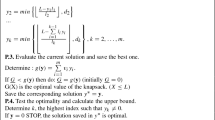Abstract
We consider a cutting problem, which have a practical application. In this problem, items are being cut from larger items, for example textile patterns from a panel of cloth. We deal steel tubes of given length, which have to be sawed from longer steel tubes. These longer steel tubes come with given costs and the sawing has to be planned such that the total costs are minimized.
Access this chapter
Tax calculation will be finalised at checkout
Purchases are for personal use only
Preview
Unable to display preview. Download preview PDF.
Similar content being viewed by others
References
Applegate, D.L., Buriol, L.S., Dillard, B.L., Johnson, D.S., Shor, P.W.: The cutting-stock approach to bin packing: theory and experiments. In: Proc. 5th Workshop on Algorithm Engineering and Experiments (ALENEX 2003), pp. 1–15 (2002)
Dantzig, G.B., Jaeger, A.: Lineare Programmierung und Erweiterungen. Springer (1966)
Dantzig, G.B., Wolfe, P.: Discrete variable extremum problems. Operations Research 5, 161–310 (1957)
Eisemann, K.: The trim problem. Management Science 3, 279–284 (1957)
Dyckhoff, H.: A new linear programming approach to the cutting stock problem. Operations Research 29, 1092–1104 (1981)
Dyckhoff, H., Finke, U.: Cutting and Packing in Production and Distribution: a Typology and Bibliography. Physica (1992)
Gilmore, P.C., Gomory, R.E.: A linear programming approach to the cutting-stock problem. Operations Research 9, 849–859 (1961)
Gilmore, P.C., Gomory, R.E.: A linear programming approach to the cutting-stock problem - part II. Operations Research 11, 863–887 (1963)
Grötschel, M., Lovász, L., Schrijver, A.: Geometric Algorithms and Combinatorial Optimization. Springer (1993)
Schimöller, T.: Kostenoptimierte Auslegung der Luppeneinsatzgebiete in der Präzisrohrfertigung. Diploma Thesis at Universität-Gesamthochschule Paderborn (1998)
Wäscher, G., Gau, T.: Heuristics for the integer one-dimensional cutting stock problem: a computational study. OR Spektrum 18, 131–144 (1996)
Wischmann, C.: Ein Verschnittproblem: heuristische Lösung unter Verwendung von Hypergraphen und des Verfahrens von Gilmore & Gomory. Diploma thesis (2005)
Author information
Authors and Affiliations
Editor information
Editors and Affiliations
Rights and permissions
Copyright information
© 2013 Springer-Verlag Berlin Heidelberg
About this chapter
Cite this chapter
Deppe, C., Wischmann, C. (2013). A Heuristic Solution of a Cutting Problem Using Hypergraphs. In: Aydinian, H., Cicalese, F., Deppe, C. (eds) Information Theory, Combinatorics, and Search Theory. Lecture Notes in Computer Science, vol 7777. Springer, Berlin, Heidelberg. https://doi.org/10.1007/978-3-642-36899-8_33
Download citation
DOI: https://doi.org/10.1007/978-3-642-36899-8_33
Publisher Name: Springer, Berlin, Heidelberg
Print ISBN: 978-3-642-36898-1
Online ISBN: 978-3-642-36899-8
eBook Packages: Computer ScienceComputer Science (R0)




